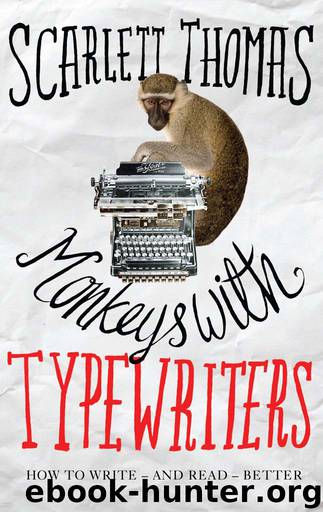Monkeys with Typewriters by Scarlett Thomas

Author:Scarlett Thomas [Thomas, Scarlett]
Language: eng
Format: epub, mobi
ISBN: 9780857863799
Publisher: Canongate Books
This is a more adult voice. At first it seems fairly objective. This is the narrator simply telling us what has been happening with Chacko’s model aircraft. But when we get to the description of Estha and Rahel and find that they ‘would spurt, like trained retrievers’ we are alerted to the fact that we have drifted into Chacko’s consciousness, because these are his words, and this is how he sees the twins. They certainly wouldn’t see themselves like this. Although we spend a lot of the novel looking out at the world through the twins’ eyes, the novel twists its perspective like a kaleidoscope, enabling us to look at them, or, through them, to look at ourselves. In this novel, we don’t know exactly what everyone is thinking all the time, but we have the potential to know. The narrator can choose to tell us anything about anyone.
This is what is usually called an ‘omniscient’ perspective. The primary OED definition of ‘omniscient’ is as follows: ‘Esp. of God: all-knowing, having infinite knowledge’. I am suspicious of the way this term is used in literary criticism, because it implies that in other perspectives – a ‘limited’ third-person narration,190 for example, or in first person – authors don’t occupy this god-like position. What nonsense. Of course we do. We are the creators of our own little worlds and therefore their gods. We do potentially know what everyone is thinking and doing at any one time. Except here we end up falling headlong into the rabbit hole of theology. Is it really possible, even for a god, to have infinite knowledge of everything? Probably; but for us this state is unimaginable. What would it be like to never be surprised by anything in our creation, or delighted by it, or moved by it?
I abandoned the concept of omniscience around the same time I first abandoned the concept of God, thinking that the problem with it was its impossibility and its arrogance and its implausibility. One of the reasons I used first person and then a strictly limited third person (which we’ll come to in a moment) was because I didn’t believe in this entity that could zoom around reading everyone’s mind. I didn’t want to believe it. I was so wrapped up in myself that I imagined that no one could ever understand me. I did manage to extend this courtesy to others, thinking that if no one could understand me then I could understand no one and all I could offer literature therefore was my own little limited first-person world.
It’s true that there is a terrible kind of omniscient perspective in fiction that trivialises, rather than celebrates, subjectivity (Richard thought he had got the better of Jack, but Jack knew something Richard didn’t. He knew that behind Richard stood a huge monster, hungry for flesh. As Richard was devoured his last thought was that he hated Jack. Jack was not at all sorry to see Richard die.) But done properly, what
Download
This site does not store any files on its server. We only index and link to content provided by other sites. Please contact the content providers to delete copyright contents if any and email us, we'll remove relevant links or contents immediately.
Asking the Right Questions: A Guide to Critical Thinking by M. Neil Browne & Stuart M. Keeley(5775)
Autoboyography by Christina Lauren(5235)
Eat That Frog! by Brian Tracy(4540)
Dialogue by Robert McKee(4401)
Sticky Fingers by Joe Hagan(4198)
Journeys Out of the Body by Robert Monroe(3624)
Annapurna by Maurice Herzog(3467)
Full Circle by Michael Palin(3449)
Schaum's Quick Guide to Writing Great Short Stories by Margaret Lucke(3380)
Elements of Style 2017 by Richard De A'Morelli(3349)
The Art of Dramatic Writing: Its Basis in the Creative Interpretation of Human Motives by Egri Lajos(3067)
Atlas Obscura by Joshua Foer(2961)
Why I Write by George Orwell(2952)
The Fight by Norman Mailer(2940)
The Diviners by Libba Bray(2937)
In Patagonia by Bruce Chatwin(2930)
The Mental Game of Writing: How to Overcome Obstacles, Stay Creative and Productive, and Free Your Mind for Success by James Scott Bell(2908)
Venice by Jan Morris(2573)
The Elements of Style by William Strunk and E. B. White(2473)
